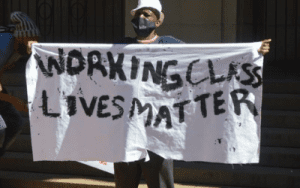The impact of COVID-19 on workers in South Africa (WWMP)
Since 2009, Union Aid Abroad – APHEDA have been working with Workers’ World Media Productions (WWMP) in South Africa on a Labour-Community Media Project which aims to provide “quality, relevant and informative media productions and access to the media for the labour movement and working class people.”
COVID-19 hits hard
 COVID-19 has hit South Africa hard, with officially 51,000 deaths by 11 March 2021, but experts analysing “excess deaths” estimate 128,000 Covid-related deaths. Covid-19 poses particular threats, with millions living in crowded poor quality informal housing settlements, and high prevalence of HIV and TB. Harsh lockdowns disrupted food supply. Over 2 million workers have lost jobs, and the real unemployment rate is around 50%, the highest of any middle-income country. Poverty and food insecurity have been massively exacerbated. The government has been implementing austerity measures, freezing all public sector wages for four years, and cutting funds to education and health.
COVID-19 has hit South Africa hard, with officially 51,000 deaths by 11 March 2021, but experts analysing “excess deaths” estimate 128,000 Covid-related deaths. Covid-19 poses particular threats, with millions living in crowded poor quality informal housing settlements, and high prevalence of HIV and TB. Harsh lockdowns disrupted food supply. Over 2 million workers have lost jobs, and the real unemployment rate is around 50%, the highest of any middle-income country. Poverty and food insecurity have been massively exacerbated. The government has been implementing austerity measures, freezing all public sector wages for four years, and cutting funds to education and health.
There is political instability at the national level, with a faction around former President Zuma mobilising, alongside populists led by Julius Malema, against ANC leader Cyril Ramaphosa. On the other hand, conflict between trade union federations has abated. Social movements remain strong, among women, landless, students, workers, rural and urban poor.
The January 2021 Household Affordability Index shows basic food items like sugar beans, rice, flour and bread have seen price hikes of between 31% and 68%. A food basket for the average South African costs around 4,051 Rand per month (about AUD $347), but the national minimum wages (that many workers do not get) is 3,321 Rand (about AUD $28%).
Hospitals are overloaded and Covid-19 testing workers lacked proper protective equipment. Vaccination started on 17 February with 80,000 doses of the Johnson & Johnson single dose vaccine, which has been shown to be effective against the variant virus, but vaccination is much slower than the crisis requires. Worker’s World Media Productions (WWMP) joined up with the COVID-19 People’s Coalition with 400 NGOs and trade union organisations to ensure a co-ordinated and united response to the social and political issues that confront the country and working-class people.
Training unionists and activists in media skills
Our partnership with WWMP is well established. Workers’ World trains unionists and activists in community media skills, and broadcasts thirty weekly radio programs each year in five languages on around thirty community radio stations around South Africa, through local Labour Community Media Forums. In 2020 WWMP broadcast 16 programs on two television channels. The programs focus on organising marginalised workers and informal economy workers, gender violence, minimum wages, HIV, xenophobia, access to service delivery, trade union news, food security, and how to respond to the health, economic and social threats posed by the COVID-19 pandemic.
As an organising strategy, Labour Community Advice Media and Education Centres have been set up in key townships so that those who hear radio programs about labour or social rights can get support, advice or referral around their own issues.
WWMP publishes a weekly online newspaper, Elitsha, mainly in English and Xhosa, covering issues important for workers and urban and rural poor, and building an internationalist awareness.
WWMP provides shop stewards’ and union educators’ training for independent unions and affiliates of the Congress of South Africa Unions (COSATU). WWMP has been building the organising capacities of emerging unions of home care workers, waste-pickers and farm labourers. WWMP is also engaged in a campaign for the rights of former mine workers and mineworkers’ widows. A total of 1400 participants took part in trainings in 2020 of whom 702 (52%) were women.
Moving forward despite the COVID-19 setback
COVID-19 and lockdown conditions in 2020 set back WWMP organising, fieldwork and popular education programs but boosted media productions and online education, with new innovations to take forward from 2021. WWMP’s use of mass media for popular working class education, and capacity building training for union and community activists is essential to maintain the struggles of working women and men for health, livelihoods and basic rights.
Support worker's rights in South Africa and beyond!
Around the world, workers are organising to build their collective power at work and in their communities. By becoming a member of Union Aid Abroad – APHEDA, you will be contributing towards projects like this that give unionists the knowledge, skills, and power to defend their rights.